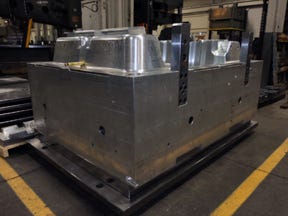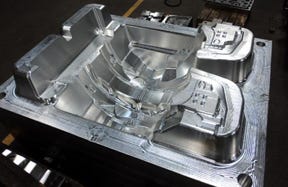Teamwork is a good thing, especially when a moldmaker is asked to do something that’s rarely—if ever—been done. Unique Tool & Gauge Inc.
January 10, 2011
Teamwork is a good thing, especially when a moldmaker is asked to do something that’s rarely—if ever—been done. Unique Tool & Gauge Inc. (UTG; Windsor, ON), known for its innovative work with large aluminum injection molds for the automotive industry, had been working with Alcan Global Aerospace, Transportation & Industry (Alcan Global ATI), a global aluminum supplier, and UTG’s automotive OEM customer for almost a year, exploring Alcan’s 7000-series alloy-based Alumold-500 and helping the customer understand how it would interact with the OEM’s product and processes.
“This was a diligent review of the potential impact of this tooling change from P-20 to aluminum for a mold for the front wheel well liners for a high-volume sedan produced in the United States,” says Dan Popescu, manager of customer applications engineering for Alcan.
|
While this particular automotive OEM has been working for several years with aluminum tooling for vehicle components, projects in which both UTG and Alcan Global ATI have been involved, the difference in this project was the size of the aluminum block required for the mold. Typically, says Popescu, Alcan forges blocks of Alumold-500 that are 27 inches thick. The block required to mold the wheel well liners needed to be a minimum of 31 inches thick.
UTG’s president, Darcy King, says they knew from the start that the size of the block was out of the ordinary. “When we talked to [tooling] material suppliers, everyone said they could do it, but when it came to actually doing it, everyone got nervous about it, so it was quite the process in the beginning to get a supplier to go with this large of a block,” explains King. “Alcan Global ATI has experience in forging thicker blocks, so after a lot of planning as to how we would go about doing this, Alcan Global ATI agreed to work with us. They wanted to try it and they were successful.”
Alcan Global ATI supplied, through a production licensee, an 11,000-lb forging of Alumold-500 that measured 70 by 52 by 31 inches. Alumold-500 starts with aerospace aluminum, and Alcan Global ATI has optimized and modified its 7000-series aluminum to address specific needs of the automotive industry, including its requirements for molding something as sensitive as “styling.”
Popescu explains that wrought 7000-series aluminum alloys such as Alumold-500 are used in many specific applications, particularly in the aerospace industry, but the company needed the different properties to accommodate the switch from P-20 steel. “7000-series aluminum has different properties than steel and has proven its success with high-volume production molds exceeding 1 million shots,” he says.
Alcan Global ATI brought its expertise in engineering the alloy for the extremely large block, as well as an understanding of the mechanical properties that would be affected when moldmakers start machining out metal and putting in features. “The need to maintain the mechanical properties and understand what happens when you forge, machine, and heat treat a block of this size is critical,” adds Popescu. “We made the investment in the forging of a 10,000-lb block, then sliced it up to make sure that all the mechanical properties were maintained to mitigate the risk for both the automotive OEM and Unique.”
Once the integrity of the 31-inch-thick block was confirmed, Alcan Global ATI produced the block for the mold. “At the time we began this program, this was the largest forging ever made in 7000-series aluminum,” says UTG’s King. “We’ve had huge success with 7000-Series aluminum grades, and Alcan’s work in producing larger block sizes on its Alumold-500 product is going to open up new application areas for production aluminum tooling for us. Our automotive customers stand to realize considerable savings if this program remains successful.”
Now that Alcan has proved a 31-inch forged block can work, there’s the potential for larger blocks—possibly 35 inches. However, Popescu notes, “We need a program identified to experiment” with a block this size. “Again, we’ll have to make a block of 15,000 lb,” he adds. “It’s possible, but it takes a lot of development resources.”
Says UTG’s King, “We have a lot of experience in building aluminum tooling, but with a block this big, lots of thought had to go into this mold—a lot of people had to input their ideas. With a tool this size, there’s a lot of inside molding pressure, and that had to be calculated and contained. As far as complexity, it was one of the most complex molds we’ve dealt with. A wheel liner is one area where, if successful, you’ve set the bar for other areas as well. While the geometry was not as complex, the aluminum made it more difficult and required proper engineering and design.”
Even with all their experience, King says UTG would have never suggested a tool like this for a first aluminum tool for a major OEM. Because UTG and the automotive OEM had worked together previously on aluminum tooling, “They were comfortable and we were comfortable” with the process, he says. “The main factor for the OEM in choosing aluminum for the wheel well liners was cycle time reduction,” King explains. “For them, over the lifetime of this vehicle, there’s a significant amount of savings in cycle time through better heat transference, among other things.”
King adds that demand for aluminum tooling continues to grow. “It’s becoming more well known that toolmakers like us can produce an automotive production tool faster and at less cost in aluminum vs. P-20 steel, and that tool will run with cycle time reductions of anywhere from 30% to well in excess of 50% vs. P-20 steel,” he says. “And at one-third the weight of a P-20 steel tool, there is less wear and tear and stress on the molding machines. Aluminum tooling is not only a high-performance molding technology; it’s an energy saver and a cost saver.”
King believes that the ability of Alcan Global ATI to forge such a huge block of aluminum and of UTG to be able to engineer and build a mold of this size is a “major step forward” for the North American plastics industry. “Our experience working with aluminum has effectively proven the cost and productivity advantages of aluminum for automotive production tools,” he adds.
As an automotive supplier, UTG had a “very good” 2010, states King. “We do in-depth forecasting, which involves the review of vehicle launches, talking to customers about upcoming work, and looking at all factors, we believe 2011, 2012, and most of 2013 should be good times for toolmakers in North America,” he asserts. “Looking at the reduction of toolmakers in North America—30%-plus fewer toolmakers in North America now than in 2007—and looking at the vehicle launches scheduled—we’re seeing a record number of launches. We should all be busy over the next couple of years.”
King adds that the automotive OEMs have been burned many times, which has served to make them more “selective and cautious” in choosing their suppliers. “We have to be better business people and smarter in how we do things. Be better at what you do, develop good customers, build ‘smarter’ molds.” —Clare Goldsberry
About the Author(s)
You May Also Like






